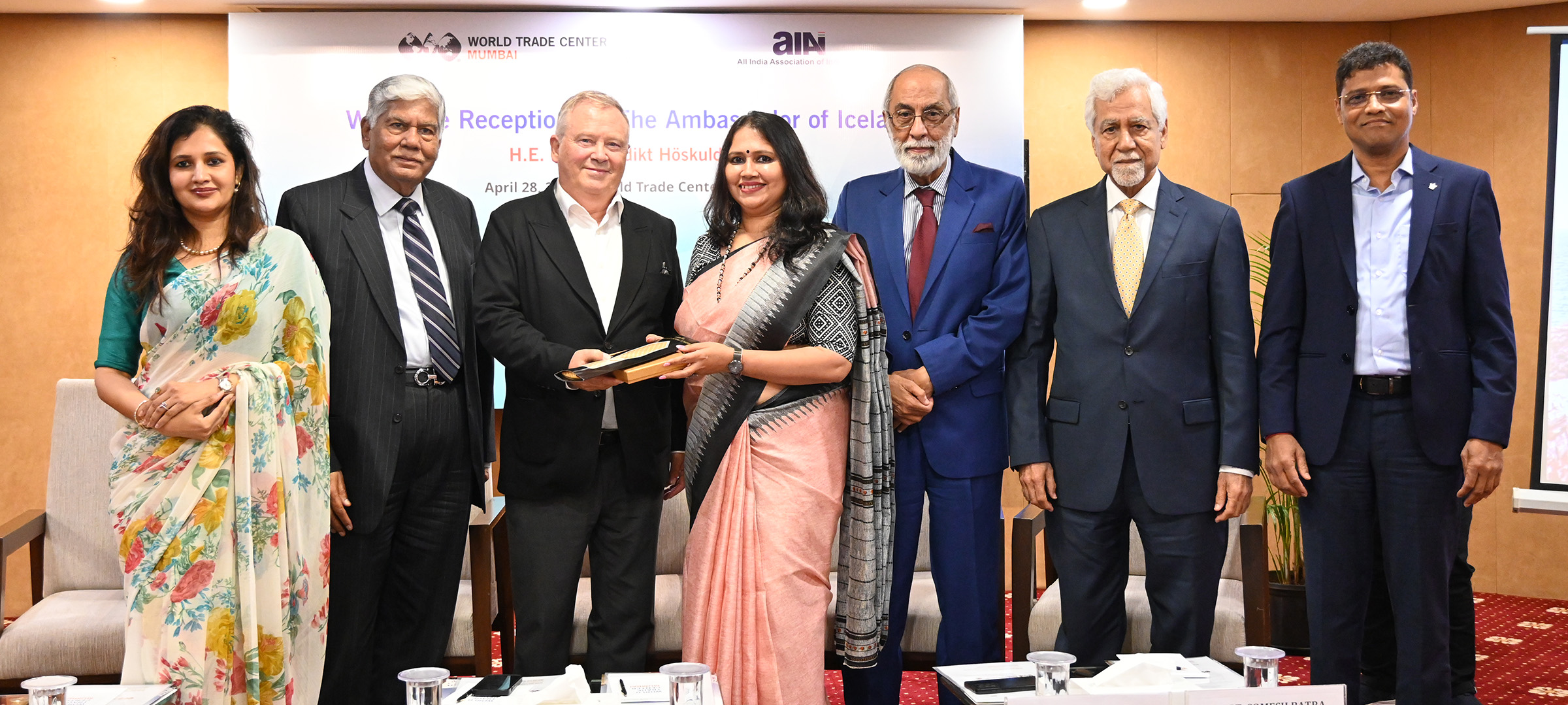



Iceland Seeks to Deepen Bilateral and Economic Engagement with India to Foster New Business Opportunities
Amidst the growing global uncertainties, India can provide the much-needed stability to global trade dynamics with its large market size and emerging manufacturing base. EFTA countries, which include Iceland, have strategic advantages as they already have a trade pact with India,” said H.E. Mr. Benedict Höskuldsson, Ambassador of Iceland to India at an interactive event organised by WTC Mumbai and AIAI.
He emphasized that while several major economies are currently pursuing new trade agreements with India, the EFTA bloc is already well-positioned to leverage its early engagement. “Today, nations such as the United States, United Kingdom, and the European Union are looking to deepen trade ties with India. EFTA countries must act quickly and strategically, as they already have a signed agreement to build upon,” Mr. Höskuldsson remarked.
The Ambassador pointed out that the ongoing global tariff tensions are driving countries to diversify their trade relationships, and that India has emerged as a preferred partner.
Turning to sustainability and clean energy collaboration, Mr. Höskuldsson underlined the growing importance of the India-Iceland partnership. He said, “Climate and energy cooperation are vital to India-Iceland relations. In May 2022, the Prime Ministers of India and the Nordic countries launched a joint task force to strengthen bilateral collaboration on climate-related issues.”
He emphasized that climate challenges are largely energy-related and that India’s proactive stance in renewable energy aligns perfectly with Iceland’s expertise. “As per the International Energy Agency, 75% of climate challenges stem from energy-related issues. Iceland is already working with Indian partners such as ONGC and Oil India on geothermal energy, and we look forward to expanding this cooperation further,” Mr. Höskuldsson said.
Acknowledging India’s leadership in renewable energy access, he praised India’s ambitious solar energy programs that have successfully bridged energy poverty. “India’s achievement in expanding solar power access to millions of households sets a global example. It is why India stands as an ideal partner for Iceland in our shared quest for sustainable energy solutions,’” he added.
Speaking about connectivity, Mr. Höskuldsson announced upcoming initiatives to bring the two countries even closer. He said, “Iceland’s major airline is set to enter into a codeshare agreement with Air India later this year. We are also exploring opportunities to establish direct flights to further enhance tourism and business exchanges between our nations. These measures will significantly improve travel and economic interaction between India and Iceland.”
Mr. Höskuldsson reaffirmed Iceland’s strong and consistent support for India’s global aspirations stating, “Iceland has always backed India’s positions in multilateral forums and will continue to do so. However, to fully unlock the potential of our partnership, both sides must redouble efforts to deepen bilateral ties.”
The Ambassador also urged both nations to seize the moment and strengthen cooperation across sectors including trade, energy, climate action, and connectivity.
In his welcome address, Dr. Vijay Kalantri, Chairman, WTC Mumbai and President, All India Association of Industries emphasized the critical role of international collaboration in helping India achieve its long-term goals.
He said, “India aims to become a developed economy by 2047 and achieve net carbon neutrality by 2070. To realize these targets, strategic investments, technology transfer, and technical collaboration, particularly in renewable energy and emerging technologies, are essential.”
He noted that Iceland and other Nordic countries, with their sovereign wealth funds, technological expertise, and leadership in sustainability, can be valuable partners for India’s growth.
Highlighting the recently signed Trade and Economic Partnership Agreement (TEPA) between India and the European Free Trade Association (EFTA), Dr. Kalantri said, “EFTA countries have committed USD 100 billion of investment into India over the next 15 years, creating over one million jobs. India has also set up a dedicated EFTA desk to promote bilateral trade and investment.”
On trade relations, he observed, “Our current bilateral trade with Iceland, though modest at USD 23 million, is balanced and offers strong growth potential. We must work to diversify and aim to double this figure within five years, tapping sectors like electronics, seafood, engineering goods, and medical devices.”
Dr. Kalantri further noted that India’s affordable electric vehicles (EVs) have a significant opportunity in Iceland, given its high EV adoption rate.
“Iceland’s strengths in geothermal energy, fisheries technology, and deeptech open exciting avenues for innovation and co-production with Indian companies like ONGC,” he said.
He concluded, “Through expanded trade, strategic investments under TEPA, and deeper technological partnerships, India and Iceland can jointly drive sustainable, inclusive growth for the future.”
The vote of thanks for the event was proposed by Capt. Somesh Batra, Vice Chairman, WTC Mumbai.